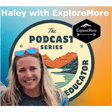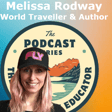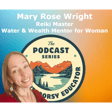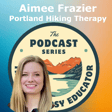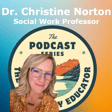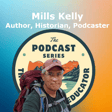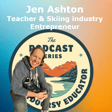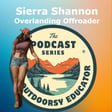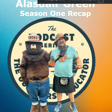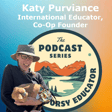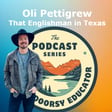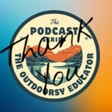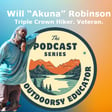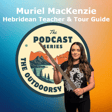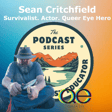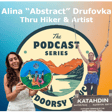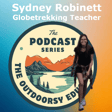Become a Creator today!Start creating today - Share your story with the world!
Start for free
00:00:00
00:00:01

Zach Darden
Join me as I speak to New Mexico conservationist Zach Darden. Zach studied geography in his home state of Indiana but returned to the land he loves, New Mexico, to help protect its natural wonder and set up a homestead. We discuss land preservation, following your passions and making the outdoors accessible all.
Recommended
Transcript
Introduction to Outdoorsy Educator Podcast
00:00:00
Speaker
you Welcome to the Outdoorsy Educator podcast, the show where curiosity meets the open road. I'm your host Alistair and I invite you to join me as we explore the world through travel, adventure, nature and the power of learning. Each episode we dive into inspiring stories from adventurers, educators and global citizens.
00:00:24
Speaker
Whether it's in a classroom, on a local trail, or adventuring halfway across the world, there are stories to be told and lessons to share. So pack your curiosity, lace up your boots, and let's discover how the world can teach us all one step, one story, one adventure at a time.
Zach's Background and Trail Conservation
00:00:48
Speaker
Originally from Indiana, Zach grew up in the Indianapolis metro area before moving to New Mexico. A lover of all things outside from a young age, he didn't just talk the talk, he walked the walk by studying geography and immediately working in the outdoors.
00:01:04
Speaker
Now homesteading in New Mexico, Zach is dedicated to promoting diversity in the outdoors, protecting public lands, and championing trail conservation for generations to come.
00:01:16
Speaker
We'll dive into his journey from the Midwest to the Southwest, what inspires him to keep our trails open and wild, and how we can do our part to make the outdoors more welcoming for everybody.
00:01:28
Speaker
So stay tuned. You will not want to miss this conversation with Zach Darden. So on this week's episode, we have Zach Darden all the way from neighboring New Mexico. Zach, how are you today?
00:01:40
Speaker
I am doing great. I cannot complain. And it's not 100 degrees today over here in New Mexico. So it's its beautiful. but and Yeah, it's hot here, but not 100, so I'll take it. I'm i'm not going to complain because I'm very aware that in a couple of weeks here in North Texas, it could be.
00:01:56
Speaker
So I'm going to take this and run with it. This would be just fine. Well, Zach, tell us a little bit about yourself. Who are you? Where are you from? What do you do? Let's get stuck into this.
00:02:07
Speaker
Yeah, yeah, no, for sure. So my name is obviously Zachary Darden. I'm originally from Indianapolis, Indiana. Moved out here to New Mexico the first time in about 2010. Kind of started getting interested in like conservation work just because of like different field trips and different things I was taking as kids, going up to the mountains and whatnot.
00:02:26
Speaker
And as I got older, I just kind of followed that passion. So I'm I'm a previous park ranger here for the state of New Mexico, but currently work as an open space resource specialist for Bernalillo County, like here in Albuquerque. So um I'm also an avid scuba diver. i also like, and I consider myself a homesteader. I build like a A small little like ranch here out here on the outskirts of Rio Rancho in the western side of New Mexico.
00:02:54
Speaker
And yeah, that's just a little bit about me. So hopefully you guys are somewhat interested in what I've got to say. Absolutely. Well, a couple of weeks ago we had on somebody who's really passionate about scuba diving.
00:03:06
Speaker
So I need to connect you guys together. She um she is is from and lives in Minneapolis. And her passion, how her life's work is trying to expose those in inland states like Indiana to the ocean, to the fish, to the everything that's in there.
00:03:23
Speaker
So I'll need to make sure that yeah you and Liz Coltenhauser get together. No, that'd be fantastic. I mean, obviously I'm in one of the driest states in the country, so it's like kind of counterintuitive.
00:03:38
Speaker
That's awesome. Well, it's funny you bring up straightaway field trips that's as ah as somebody who's in public education. That's one of my passions because often um I've talked about this before. um We'll take sort of, you know quote unquote, inner city urban kids out on field trips and their eyes just open. They get to see a world they didn't know before and they kind of shed their armor a bit.
00:04:00
Speaker
And they just, and instead of becoming kind of hardened individuals, they're just babies. You know, they're just kids playing with sticks, playing with rocks. And it's had a profound impact on me. So I'd love to hear that, you know, field trips had that on you.
00:04:13
Speaker
Now, in terms of your family, were you like an outdoors kind of family, or was that more driven by the field trips in school?
Influence of Family and Education on Zach's Love for Nature
00:04:19
Speaker
Really? I mean, kind of both, yeah. So it's kind of funny that you brought that up, just how, like, yeah, the kids, as soon as they get outside, they start playing with sticks and bugs and everything, and they just, like, kind of get super wide-eyed about it.
00:04:29
Speaker
Because that's exactly how I was as a kid. Like, we had a little creek in our backyard, so me and my brother spent most of our time out there just kind of, like, fishing in the creek and fishing. playing in the forest and just kind of just hanging out there.
00:04:42
Speaker
um And my dad, he introduced me to like camping and fishing and hunting and all of that kind of jazz, like at a young age. So, I mean, it kind of just stuck with me. And then, yeah, going on different field trips and on vacations when we were in the kind of like these more remote and like wilderness kind of spaces, it just once again, like just felt like home to me. So it just kind of connected me to want to actually maybe do this as a career. I mean, it's something that I always say to myself, like I'm going to places right now for like work that I would be going anyways, like I wasn't working there. So yeah, definitely put up with it. I feel like my entire life, like it's just the outdoors are kind of where I call home and I'd rather be outside and i don't know, sit in a cubicle. So it works out.
00:05:27
Speaker
Yeah, that's one of the reasons I'm in education and teaching is I want every day to be different, and sitting behind a desk all day is not for me. I'm inside a lot, so, you know, that's fine, but I'm always trying to get outdoors, and yeah, I couldn't be in the cubicle either.
00:05:42
Speaker
It's nice when it's 100 degrees outside, I'll say that, but it's like 100 degrees, put in the cubicle. Yeah, it's 100 degrees, give me some desk work, that'll be absolutely fine.
00:05:53
Speaker
yeah So now... I love the people that I've spoken to are really into the outdoors, a bit like myself. I'm really into the green spaces, you know Appalachia, the Northwest, and they're off to Maine.
00:06:05
Speaker
What's drawn you to the Southwest? That's arid. In my mind, that's tough. yeah You know, like that's a tough landscape. But there's a certain kind of person that's drawn to that.
00:06:16
Speaker
Yeah. What's drawn you to that? so Definitely. I mean, yeah, I agree a thousand percent. It's definitely a rough landscape. I mean, most of the creatures that live here have to be pretty hardy just to exist out here.
00:06:28
Speaker
um Well, and the first time, like I said, I moved out here was in 2010. I was pretty young um and I had actually never been to a desert before. Like growing up in Indianapolis, I mean, it's more like... kind of green, flat, cornfield-y. I mean, you have like some kind of rolling hills in the southern portion the state, but nothing like this. So when I came out of here, it just kind of struck a nerve that I'm like, man, this is insane. like The environment is so different. like There's these huge mesas. There's volcanoes. There's mountains. There's
00:06:59
Speaker
Plains, like there's just such a vast like variety of geography here that um I think that's what kind of sparked my interest is just how different the Southwest is from any place I'd ever been and how it can shift so quickly. I mean, I can start my day like here and like kind this low hanging like, um,
00:07:17
Speaker
air desert to actually getting up to the mountains to some of like the ponderosa pines and the white aspens and just really like those real high kind of 10 000 foot elevation zones which is kind of insane um so i think yeah just the variety of the land is literally what like kind of It struck my imagination and also too, there's a lot of culture in the Southwest. I mean, just coming out here and learning about like some of the outlaws, like Billy the Kid or ah like some of like the Buffalo Soldiers and all these different like stories of people that have kind of like traversed over
Exploring New Mexico's Landscapes and Culture
00:07:50
Speaker
this land. It just, yeah, it just felt like a place that I kind of want to imagine myself living. And that's kind of why
00:07:57
Speaker
stayed out here. and it's beautiful I love it. Yeah, and it's some place that I think we stereotypically think is very hot, which it is, but I'm pretty sure that it can also get very cold as well. I'm sure that varies on the elevation.
00:08:11
Speaker
yeah Yeah, we've um it's kind of weird too because that's the thing, especially in kind of living out where I live, it's kind you kind of have to be ready for everything. I mean, yeah, we have these 100-degree summers, and then in the wintertime, I mean, I've seen it get down to like the negative 15 negative 20 range which is kind of insane I mean it's just really right one extreme to another and you just really have to be kind of prepared for anything really like they always say like if you don't like the weather in New Mexico wait 10 minutes and it will change right right and it's it's somewhere it's it's a neighboring state to me but I've only explored just two tiny corners of it I've been to the northeast corner which if anyone drives from the Dallas Metroplex where I am to Colorado
00:08:53
Speaker
You just, you cover around through the very corner of the Northeast. And then I've also been to the Southeast. yeah um I went hiking in the Guadalupe mountains, but I've just touched it a little bit. So said to my wife a few times, I need to get to Albuquerque to Santa Fe I want to see these adobe homes. I mean, truly ancient history lives in these hills. yeah you know I want to see some of it.
00:09:16
Speaker
And it's such a big state, too. And I think that's the other thing that kind of drives my interest with the Southwest. It's just how vast it actually is. I mean, New Mexico as a whole is like the fifth biggest state in nation. And where you're at, Texas, second biggest state. I mean, we just have some huge, like...
00:09:30
Speaker
expanse of land here and it just it just changes so drastically. I mean, um I got a chance explore, was it Carlsbad Caverns last summer? And that was just insane. I mean, I literally felt like I was on a different planet and that's only a couple hours from where I live right now.
00:09:45
Speaker
So, yeah, it's just so much to like see and explore. and it If anything, like I can spend just a lifetime just in exploring this one state, let alone like Nevada, Arizona, like all the other ones. So, it's pretty cool.
00:09:58
Speaker
Yeah, something that I try and I try to talk to anyone who will listen is, you know, we see people, especially on social media and stuff, going to far off places and exotic lands. And it's amazing. You know, it's amazing, incredible places.
00:10:12
Speaker
But pretty much wherever you are, there's so much right around you. You've just got to look through that lens. and North Texas is not the most exciting outdoorsy kind of place.
00:10:22
Speaker
But yet, if you look, you'll find incredible, beautiful places. I'm sure it's the same there. Yeah, no, for sure. And I mean, that's kind of the thing I tell people just with the desert as a whole is that, I mean, most people look at these desert landscapes as kind of like this lifeless, brown, just dry, just nothing environment. But it's like, yeah, when you really get into like the weeds of like the desert, I mean, there's a lot of like variety of life here. i mean, we have things as small as like, oh, like a Tarantula hawk wasps, the things that's like as big as an antelope kind of running through here. We have mountain lion. We have all kinds of different just variety of just organisms in this one space that, yeah, it's not just like this lifeless, dry, kind of dusty environment everybody pictures it is. So, yeah, it's super, super interesting.
00:11:07
Speaker
Yeah, you might just have to dig a little deeper, possibly, to see all this incredible stuff. But it's there. Yeah. It's there, and it's it's amazing. Yeah. So tell me how you got into it. believe you studied geography, right, at the indiannet was it Indiana University?
00:11:22
Speaker
Yeah, yeah. so um yeah, yeah i kind of went through it. Kind of strange transition when I first moved out of here. So I stayed out here, like I said, for several years, and I ended going back to Indiana and finished high school there, started college.
00:11:34
Speaker
And my original major, like, was motorsports engineering because i that's another passion of mine is I do like to work on cars. Like, engines kind of sparked some interest in me. But I was just like, there was just something missing about I was like, okay, this is cool. It's whatever. But not only, a was it way too much math that I wanted to deal with, but, too, it was just like that. This is a...
00:11:54
Speaker
It doesn't feel right to me. So, um yeah, I actually switched my major three times. I went from motorsports engineering to environmental science to somehow landing on geography. um And I think something about geography just felt right because, like I said, I like studying landscapes. I like studying like the way that um the topography of the land shifts and things like that. And that's kind of what geography is all about.
00:12:19
Speaker
So yeah, I did a focus in GIS, which is like the geographic information systems, like a mapping application. And yeah, I started kind of getting my like toes into that by um actually doing an internship with the Forest Service, kind of mapping some of their ah like different trail systems in a mountain range called Mount Taylor, which was really cool.
00:12:39
Speaker
oh And yeah, it's just, i don't know, it just felt really good to me. So I stuck with that. I think halfway through my college experience, like in 2018 is when I moved back out here to New Mexico.
00:12:50
Speaker
And yeah, just kind of started my, I guess, work in conservation as like working working as like a trail lead on like this organization called Rocky Mountain Youth Corps, where we were building like hiking trails, like kind cross-cutting trees, <unk>m just doing a lot of, um,
00:13:06
Speaker
really labor-intensive conservation work. I mean, it was fun, but it was exhausting and hard, and I actually tore my rotator cuff doing it. oh Wow. Yeah, and then, yeah, that kind of branched onto other conservation jobs that I've kind of done here, but, yeah, geography was the way, and that was a super long answer to such a short question, so hopefully he did.
00:13:27
Speaker
I leave y'all there. No, no this this is what we want because any long answer leads to more questions. Yeah. So I find this because I think being a a park ranger is kind of like you are actually a park ranger. Is that correct at one point? Yeah.
00:13:40
Speaker
So I was kind of up i said started out building trails. Then I started the next job is kind of doing outdoor education. So there's a small company out here called Cottonwood Gulch Expeditions, and they lead kids on like different wilderness tracks and like they teach them how camp and they do things like that. and um It was kind of crazy because the founder of that organization is also from Indianapolis, like where I'm from, which was kind of ironic.
00:14:06
Speaker
and yeah i just made a lot of different connections with that job and connections with the previous job, by Rocky Mountain Youth Corps. and It led me to actually partnering with like some park rangers um through this organization called albuquerque opens or abuque the City of Albuquerque's Open Space Division.
00:14:23
Speaker
And, yeah, they had asked me, like, midway through my season, like, hey, like, we have this part-time role open up in the fall. Your season ends, like, around that time. Would you be interested in working for us?
00:14:34
Speaker
And, I mean, I was kind of hesitant because it wasn't really paid a lot. um I was still in college. it's just It was going to be a huge transition. But i was like, you know what? Just screw it. Like, I'm going to try and see what happens.
00:14:46
Speaker
um and And, yeah, that's what led me into being a part-time park ranger and then did that for probably about – five or six months and then um i landed a full-time role with that organization and i stayed with them for almost four years which was like yeah some of the best experiences i've had in my career world were like working as a park ranger and that's actually what led me into my current role now it's like a resource specialist so it's just kind of cool like seeing how all these different conservation agencies like in new mexico all kind of tie together and It's just, yeah, it's just I never, never once would have thought, oh, this Brandon kid, me, moving from Indiana to New Mexico would have been on this journey that I'm on. So it's been kind of pretty exciting.
00:15:29
Speaker
It's so good that they're all working together for a common goal. and And I'm sure there's some disagreement and politics and that's life. But it's nice that everyone's together, though. Yeah, definitely.
00:15:41
Speaker
I've spoken to few people who do trail maintenance. You know, they go on the Appalachian Trail or local trails. They go wherever and they pick up trash and they remove trees. and How do you go about building a trail? like what's the What's the mindset and the process to go from kind of, here's an idea, we need to trail from A to B.
00:15:59
Speaker
Yeah, actually opening up to the public. If you could kind of talk me through that, I think that would be really yeah interesting. No, for sure. Yeah. So that's the thing about it. When I first learned that I was going to be constructing hiking trails.
00:16:10
Speaker
I mean, I envision it just like, oh, you pick a spot and just cut all the trees and make a path in the end. Um, but it wasn't, yeah, there was this whole kind of intricate, almost like scientific process that goes behind it where, i mean, the first thing is obviously, yeah, you do want to pick like a location and there's a couple of different factors that you want to keep in mind. Like, okay, well, is this trail going to go through any like habitat? Is it going to go through any cultural ruins? Is it going to go through anybody's property line? So there's all these different factors that you have to keep in mind before you even like
00:16:42
Speaker
put boots on the ground. And after that, once you kind of have your trail like in mind of where it's going to go, it checks off all those boxes. Then we have to go in we actually have to start flagging the trail, which is sometimes a little bit more intensive than i guess most people imagine it is because um the thing about it is like you have to use all these different tools to do it. So like an example, there's this tool called a clinometer and it's a weird little tool. It's like it actually kind of looks like a little like monocle a spyglass, whatever you like, tiny little thing you look through, but you have to look through it and keep one eye open and like, also like trying to look at the land at the same time. So I guess both guys are open, if that makes sense.
00:17:22
Speaker
And what it does um is it measures the grade of the land. So you can't put your trail on like two pitched of a slope because obviously it's going to erode and run off and that's going to damage your trail, but you can't make it completely level either because yeah, same thing. It could flood,
00:17:40
Speaker
The snow is going to start eventually, like, accumulating, and that's going to roll your trail. So we use the clinometer to measure what's called, like, the half rule. So let's say that your grade is at 20%.
00:17:51
Speaker
Like, you want to have your trail go at 10% of that grade. So kind of, like, trying to factor in that. and the thing about it, too, is that and some trails are really easy to design if you're in, like, a pretty, I don't know, like...
The Science and Art of Building Hiking Trails
00:18:06
Speaker
temperate environment or if you're not on really steep terrain or there's not like bad weather. But yeah, when you're on like these super rocky ridges or like way out in the mason, there's no shade coverage or anything. like That can be kind of a tedious process to go through and like do the half roll and flag all the... like I guess, terrain.
00:18:25
Speaker
And then once you do that, then you finally go through and like, okay, like now you have to remove some of the bigger trees, either by chainsawing or cross cutting. Then after that, then you finally start establishing and like your drainages. So it's like a whole process to really get these trails like established. and I think it really just depends on a the crew that you're working with and be kind of like the terrain you're working with. Because yeah, I mean, I've seen trails that we've taken, mean,
00:18:51
Speaker
almost a year just to like map out and flag and we finally start working on it and then six months later it's just completely gone because yeah it got washed away or somebody didn't measure the grade correctly or sometimes even just users like the visitors that come through won't want the trail there and they're going throw like different logs and just slash and stuff in it and close off what we've done which is kind of irritating so it's a process it's a process for sure Yeah, I've been following. There's a a small group who are trying they're trying to make a trail. Well, they are making a trail called the XTX Trail, which goes all the way across Texas.
00:19:29
Speaker
um They have lofty lofty goals, but I think they're going to do it. They have the people behind it. ah basically making it like a Southern Appalachian Trail almost. You know, it's going to be it's long, course, it's going all the way across Texas at its longest point, um ending kind of near Big Bend.
00:19:46
Speaker
So just south of you. And it looks amazing. Like they want to make it for bikes, for equestrian, for for hiking. And I was really interested in in listening to the guy's story. I wish I could remember his name, but um it's the ex-Texas Trail, I think on Instagram.
00:20:02
Speaker
um Because he was saying one of the challenges was Texas has so much private land. Yes. So the trail was going to have to navigate around. And they prepared a whole spiel about trying to convince people to let them go, you know, scart around their land and this, that, and the other.
00:20:18
Speaker
But he was taken aback because actually he said every single person, every single person, Rancher, they're almost always ranchers that they encountered said, no, we wanted to go through our land.
00:20:30
Speaker
Do you mind if we build some lean-tos, some this and that, charge people $5 a night, you know, next to nothing, but just to generate some extra income and just bring tourist dollars to the area, which I just thought was fascinating because they were surprised and I was surprised, but people were so welcoming to the idea of this trail. They like they were fighting. They wanted it on their land.
00:20:53
Speaker
Yeah, see, and that's such a like refreshing feeling when people like they they respond like that because, yeah, I feel like I've ran into kind of a mix of both where, yeah, I've ran into people like, yes, please build a trail through my property. like That'd be really cool. Then I can work with some of the visitors and blah, blah, blah.
00:21:09
Speaker
And then I've also met other people that want absolutely nothing to do with it. And like like i said, they're closed off the work that we've done. And they try to bring us to court and like all these crazy things. So it's just yeah it's just kind of mix of both. like Some people are super supportive of it and other ones are just like, get the hell away from me. I want nothing to do with your project. So it's kind of crazy. Yeah, I'm sure there's some people who move.
00:21:32
Speaker
to New Mexico, Texas, other rural places to get away from everybody for whatever reason. So the last thing they want is people hiking through their trail or through their property, potentially not following leave no trace, all that kind of stuff. So I get it. I understand. It's not me, but I understand why some people want that, you know, just to keep that solitude.
00:21:56
Speaker
yeah So hope open space is who you work for now. Is that correct? Is that a a county division? Yep, that's correct. um Just kind of like what you were saying before oh about like a lot of these agencies like working together, it's kind of crazy because there's actually two different open space organizations in the same city.
00:22:14
Speaker
So yeah, there's the city of Albuquerque's open space division, and that's the one that I did my kind of my park ranger work with. And then there's Bernalillo County's open space division, and that's who I'm working for right now. but kind of same mission, same name, lot of their properties can join together, but still two different agencies, which sometimes they want to work together sometimes they won't, which is just really strange to me.
00:22:37
Speaker
hey Right. And then how is there kind of like ah an outdoors culture there? Are there people who are out on the trails a lot or are you kind of trying to create something and hopefully draw people out or is there already that base of people in Albuquerque and surrounding
Outdoor Activities and Diversity in Albuquerque
00:22:54
Speaker
areas.
00:22:54
Speaker
Oh yeah, I think, and I could be wrong about this, but i if I recall, I think either one-third or two-thirds of land in New Mexico is public land. I could be wrong about that number, but it's it's pretty high up there. So especially here in Albuquerque, mean,
00:23:10
Speaker
that's what actually draws a lot of people like to the city is because of like outdoor access. I mean, you have like the Sandia Mountain Range, which is like super popular. People want to go explore that. I mean, you have like the Boss Gate, which is like the Forest Salon de Rio Grande.
00:23:24
Speaker
um I mean, you have like the Petroglyph National Monument. I mean, there's a lot of different areas just here in Albuquerque that people really don't have to venture too far out of town just to actually see these like wilderness spaces. So, um yeah, I would say there's definitely a huge...
00:23:40
Speaker
outdoor kind of like enthusiast population here in Albuquerque. And it's just growing too. I mean, like just in my time of living in New Mexico, so I've seen like just a huge, like almost kind of movement of people just coming out here for that exact reason, which is good because I mean, we're getting more people into the outdoors, which is kind of the goal.
00:23:58
Speaker
But in my opinion, it's also bad because you're getting a lot of people that don't respect Atlanta, don't respect some of these natural places. And yeah, they come through and trash it or set things on fire. And um that that's just always been kind of an an issue too. So a mix of both.
00:24:15
Speaker
Yeah. Yeah. A lot of the the sort of the big outdoorsy influencer people that follow often talk about gatekeeping. And yeah it's it's a constant struggle, right? And nobody, there's no right answer to the situation.
00:24:30
Speaker
If they've got, ah making up numbers, you know if they've got million followers and they go hiking, there's that debate about whether they should post where they are. Because you don't want to be holding these things back. They're public lands. They're for everyone. and We want everyone out there.
00:24:43
Speaker
Exactly. But then sometimes you get everybody out there and the place is just is just littered with, again, people not following the leave no trace principles. yeah so it sounds like you're experiencing something very similar where it's, yeah, it's a constant struggle, I imagine, of wanting everybody but wanting people to adhere. Yeah.
00:25:01
Speaker
Yeah, 100%. mean, like an example, like i always tell people, at least coming out here, is that we have these hot springs, look kind of near where I live, actually, um called the San Antonio Hot Springs. And they're up in the Jemez Mountains. They're beautiful, natural springs from like the magma chamber that's underground.
00:25:17
Speaker
um And at first when I like came out here, like they were pretty remote. like Nobody really knew about them. They were just kind of like that little hidden gem up in the mountains that people would go to and just spend a relaxing weekend.
00:25:29
Speaker
And I noticed once that AllTrails app got super popular, Now the Springs are just like, yeah, they they' turn into a little party spot. You see people up there with their big like JBL speakers and beer cans everywhere. and like Sometimes people let their dogs get in the Springs. I mean, there's still a beautiful space, but since they are kind of remote and out there, like they don't really get a lot of enforcement from like the Forest Service or Game and fish or anything like that. So then yeah, yeah you get some of these people that just look at these as like, oh, like there's these hot tubs up in the mountains. Let's go up there and get drunk and trash it all. So that that's just been something that I just seen as it's a little concerning to me.
00:26:09
Speaker
um Just because yeah, like you just I don't know, you really don't want to like you said gatekeep these things from people. But I just think there sometimes has to be more education, like how people can like learn to leave no trace principle and how they can learn to, hey, like oh make sure if you come into a space, like you're you're respecting like the environment. like You're not like making a ton of noise. and like just I don't know. it's It's not a jungle gym. like That's the way I always try to inform people. And also, too, we live in such a dry environment out here is that when you get people coming from
00:26:41
Speaker
I don't know, the Pacific Northwest where it's always wet all the time and they're starting their little campfires up there and it's not a big deal. They try to bring that same energy down here and that's why we have these huge like wildfires starting like up just left and right down here which has been kind of another major issue.
00:26:58
Speaker
Right, and yeah, you're absolutely right. You know, it's education. It's people can still go and have a good time and hang out with their friends and that they and have a drink if they want but there's There's a way of doing it that maintains it for the next person or the next person down the line. you know don't Don't litter the ground with beer cans and then just take off.
00:27:17
Speaker
yeah Yeah, exactly. i mean alsoly yeah Oh, sorry. I didn't mean to cut you off. No, you're good. You're good. No, go ahead. I was just going to say, yeah, that's even something when I was a park rancher, I would encourage people.
00:27:29
Speaker
It's just bring a little like Walmart bag or trash bag with you. And just like, if you see things along the way, just pick it up. I mean, that was the easiest way. People would help us. It's just, yeah, like kind of being a steward of their own land. Like i'm like, hey, you already going out there. Like obviously don't pick up something like dangerous, like if there's like a needle or broken glass or whatever. But if it's safe to pick up, then didn't yeah, just help us out. Because um clearly that there's more land than we have time to like or energy to go all clean. So yeah, we have people out there. Just we try to encourage them to like, hey, if you see something that we didn't see, just can you just help us out a little bit?
00:28:04
Speaker
Yeah. Yeah, I love it. Now, I know something that's important to you is bri is actively bringing diversity to the outdoors. Absolutely. i think that's something that we ah we we all agree is a good thing. Yeah. But sometimes, I'll be like being frank and honest, especially as like a white guy, I'm like, I don't know what to do.
00:28:25
Speaker
I want the diversity. I like the diversity. I love it when you see people have You know, different colors, different ages, old people, young people, male, female. i love it it. It just brings a color and a spice to the outdoors.
00:28:36
Speaker
Exactly. But how is it that you can you can go about actively... exposing the outdoors to to people. Yeah, I mean, the first thing i would say is just me being like a face of diversity in like the outdoor field. i mean, when I was a kid, like i always say this all the time, like I would go to like the Smoky Mountains down in Tennessee or we go to like the Grand Canyon, all these national parks and whatever.
00:29:00
Speaker
And most of the people I would see that working in these places were just white guys. And I was like, hey, this there's I kind of want to, well, why don't I see anybody that looks like me? Like, I kind of want to be like that face to like show like more African-Americans or Hispanic or Asian or like just, yeah, people of color that, hey, you guys can work in these fields too. Like, this is something like that should be inclusive for everybody, not just like one specific type of people.
00:29:25
Speaker
um So I think, yeah, number one, I just try to kind of be that face and like that voice for people to like, hey, like you guys can can do this. And I mean think the other thing, too, is there's kind of like this lingering stereotype that, oh, black people shouldn't be in like the forest because and I think it actually stems back when I put it into perspective to slavery days. I mean, like when we were like enslaved, I mean, we were in very rural kind of like forested areas, like areas that a lot of African-Americans would not want to go back to now because I feel like of that traumatic kind of almost PTSD mindset that like, hey, we associate a forest with slavery, which is kind of insane.
00:30:07
Speaker
So I think that I'm trying to like change that narrative of like, hey, like you can go into a forest And associate that with healing, ah associate that with being outside, associate that with like the species that live in there. Like you don't have to associate this with this kind of negative, dark connotation, which um I would say like if you have a bad memory of a place, like let's say you went to a waterfall and like that was the place that your girlfriend broke up with you.
00:30:35
Speaker
The easiest way to break that memory is to go back there and to make a better memory. So I think that that's kind of like a little bit of like my philosophy is that, hey, OK, this forest down in the south maybe had a bad memory of something terrible that happened there in 1775 or whatever.
00:30:53
Speaker
I want to go back to that forest and bring like a kid or bring like a family member, bring somebody. to have a better experience with it. So then they associate that place with like a good time. So I think that's been just kind of my mission is trying to like reshape,
00:31:07
Speaker
this kind of, I don't know, like, yeah, untrue narrative that, yeah, forests and outdoor spaces and, like, these wilderness spots are just, that they're they're they're not dark, evil places. And, like, yeah, I mean, obviously some terrible things have happened in them, but the land itself is is healing, and I want people to just experience that, because nature has definitely healed me in a lot of different ways, and it heals most people that go into it um Now, obviously, yeah, like it's not fun to be dealing with mosquitoes and gnats and all the other things that we don't typically enjoy.
00:31:38
Speaker
um But there is a lot of, ah there is a lot of like joy that you can find but just going into out outdoor space and really just immersing yourself into it.
00:31:49
Speaker
Yeah, it's fascinating to me because I, in my ignorance initially, when I, I asked a couple of people, you know, why why is the outdoors so white? If we'd be frank.
00:31:59
Speaker
And people, it's just not, you know, I would ask some African-American friends and they would say, well, it's just not something on our radar. And i I kind of left it at that. But then I really did. Whereas the more we talked, there was generational trauma that had stemmed from that. And it was a fascinating subject. I love what you said about it being for healing.
00:32:17
Speaker
Yeah. Because that's that's one of the reasons I love being outdoors. Yeah. yeah I can really clear my mind out of so of all the noise and the distractions and deal with whatever it is internally I need to deal with.
00:32:29
Speaker
yeah Because it's just me and the trail. you know its It's so healing and so powerful. Yeah, no, definitely. And I think that um that's just the other thing. that It's just one of those things, too, that I've been also trying to encourage like people of color that when they like say comments like that, oh, it's not on our radar, oh, that's only like a white people's kind of sport, or like oh, that's only something that like people that yeah are just of... like different races do. like like I know what an example is that like a lot of black people still are in this narrative of like, oh, well, we don't go into the ocean because like I can't swim. or We don't want to go to the lake because like that's not something we do. i don't want to get my hair wet. Blah, blah, blah.
00:33:09
Speaker
And I still think that, like you said, that's from generational trauma of the transatlantic slave trade and all that kind of throwing people overboard. It's like almost like there's still this fear of water, which is crazy. So I think The other thing too is that, ah Yeah, a lot of times in the past, like it was kind of sad because black people that did get interested into like that kind of world or Hispanics or whatever, there was kind of gatekeeping in the past because of yeah like the Jim Crow laws or like different things like that where they couldn't even they weren't even allowed to go to, like like let's say, the Grand Canyon. or I mean, that's just a rough like example. but um
00:33:49
Speaker
Or they weren't allowed to go to like their neighborhood pool. They weren't allowed to go to like the Great Lakes or things like that. So I think now... I'm still trying to break that narrative. Like, hey, hey, you guys, you know, that was a terrible time. Like, it sucks that we weren't allowed to go to those places, but but but we are allowed to go there now. So but let's, like, get rid of that agenda that, hey, like, people are going to gatekeep from you going there, that, oh, some traumatic thing is going to happen, that, oh, like, you can't get your hair wet. Like, go enjoy it. Like, it's it's worth enjoying. And I think the outdoors – It's something that everybody... Like, we were outdoors longer than we were indoors. I think everybody needs to get that experience before they just try to shut it down. Because, yeah, and people were...
00:34:28
Speaker
In nature, like I said, we were connected to nature way longer than we were connected to AI and to computers and to Xbox and all this other stuff. So, oh I don't know. Like I said, another long answer for a short question.
00:34:42
Speaker
No, I love it because, like I said, it just leads to more thoughts and more questions. And yeah this is going back about 10 or 15 I've got nothing against Oprah Winfrey whatsoever, but I never really watched her chat show.
00:34:54
Speaker
But i did watch one episode, and I need to try and find it again, where she went camping in Yosemite with her friend Gayle King. And they interviewed an African-American park ranger who was one of literally just a handful in the nation.
00:35:06
Speaker
yeah And they had a very fresh, organic, eye-opening discussion about a lot of the stuff that we're talking about. And it's it's now old enough. It'd be really interesting to revisit that if I can find it online to see how things have changed.
00:35:20
Speaker
Yeah, no, for sure. Yeah, it was really, really good. I'll share it with you if I find No, I don't. Because that's the thing I have noticed, too, is that I feel like there is, like, this shift starting to happen where we are starting to see a little bit, like, more people of color into these fields. I mean, even just from when I first came down here to New Mexico, like, oh.
00:35:41
Speaker
Yeah, like I was the only like person of color on like my trail crew, as well as when I was like an outdoor trek leader, as well as a park ranger. I mean, I was literally the only in our whole division of open space, the only black person that division. But then nowadays, like in the division I work now, we have a couple people of color. It's just really exciting to see.
00:36:01
Speaker
And I think that's maybe what social media, like that's a plus of social media. is like It's starting to like open the door that was not open for the longest time. To show people that we can do these kind of jobs. oh I actually did a podcast. This was probably a year or two ago. I think, yeah, i almost three years ago now, i think of it.
00:36:19
Speaker
um Called the Black Park Ranger Experience. And there's this guy out in L.A. And he was a Black Park Ranger for, i can't remember the name of the park, but he worked at. But yeah, he just kind of went on this journey of finding different park rangers that were people of color all around the nation. And yeah, I think most people, like you said, said kind of similar stories that like, hey, I'm the only person of color in my field or my division or my agency or whatever.
00:36:45
Speaker
And I think it was crazy because even just from that podcast till now, I've seen just more of a growth of people of color. So I think Whatever movement's happening, I don't know what to classify it It's working, I think. So it's like I guess that's a ah plus for sure.
00:37:03
Speaker
Oh, absolutely. And you're right. It's probably this obviously pros and cons to everything, including social media. but I imagine that's one of the biggest pros yeah is that there's a lot of people who – yeah they people of color who are outdoors and they want to expose the outdoors to more people. So they create a platform for themselves and ah normalizing it for everybody. And I just don't think we can stress how important that is.
00:37:28
Speaker
Yeah. You know? Yeah. Yeah. It's something I've always worked in what we call here, title one schools, which is low socioeconomic schools. And it's just been such a passion of mine to ensure that everyone knows that Like my classroom, my offices, everything's always had an outdoors theme.
00:37:47
Speaker
Yes. Because I always find a good icebreaker. um Oh, what's that? What's that? I'm from there. I'm from here. you know And just trying to stress that this is not for me. This is for all of us.
00:37:59
Speaker
Yes. um Whether that's the local park or a national park, they're made for everybody. Yes. And I just love that you are fighting that good fight too. Just making sure that everyone knows.
00:38:11
Speaker
And speaking of what you said, I think that's also like part of the fight now is just trying to get more youth and kids into the outdoors. Because I think that's one of the negatives of social media is that we we have so much technology now around it that people just don't have the need to want to go outside. They're like, oh, well, why go out and get sweaty and get dirty and stuff? And I can just look at this beautiful view on TikTok or whatever.
00:38:35
Speaker
So um yeah, and that's the thing. Like being an outdoor like educator for a little while, I noticed, I mean, there were kids I'd take out on the hiking trail and they had never even been on a trail before. Like they were stumbling over a twig or like they they didn't really know what to do. Like if, oh, it started raining and like put the rain jacket on. They just had never had exposure to that. So, um yeah, I think getting kids outside and having them not only have a experience with nature, but having now like a love and a respect for it, like that's going to keep thick these agencies alive and keep people like wanting to protect spaces because they care about them.
00:39:10
Speaker
I couldn't agree more. Now, you dropped one word in at the beginning of our conversation here that I'm going to latch on to because I've watched just enough Homestead Rescue to be dangerous and get stupid ideas in my head.
Living Off-Grid: Challenges and Benefits
00:39:24
Speaker
Talk to me about your homesteading. What's that like? Why do you do it? The pros, the cons, the good, the bad, the ugly. I'd love to hear a little bit about what you what that means on a day-to-day basis for you. Yeah, no, for sure. So um it was kind of crazy. So I think what started this whole journey was me being a kid going down to Tennessee because we'd go down to Tennessee every fall and we'd stay in a little cabin. and like It was super cool. like I loved it. i mean We had a wood-burned stove in the cabin and we'd go explore Gatlinburg, which is a really cool little town. I mean, not even little anymore.
00:39:55
Speaker
It's pretty cool quickly. um But, yeah, when I was, like, a kid, i was like, yeah, you know, i one day I kind of want to build a little cabin. So um I remember going back into, like, the forest in our house, and we'd build, like, little, like, stick structure cabins. I mean, of course, the name would never last because we were eight years old trying to build a house or whatever.
00:40:13
Speaker
um But, yeah, that was something that I kind of just kept that dream, like, going into, like, my teenage years and adult years and all that. And, yeah, in 2020, like, right actually before the pandemic had started,
00:40:27
Speaker
um i bought an acre of land way out here and like i said rural rio rancho in new mexico and i really didn't know what the hell i was doing i was like hey you know what i have this land now um want to put something on it but i don't really know like loops like because nobody had ever educated me on how to build a house or anything so i was like you know what i'm just gonna like dive into this and see what happens so yeah in 21 i started building my first little cabin here on this property and yeah i mean the first year was definitely rough like i it's I had an outhouse outside. like ah I didn't really know about like okay the right depth of buried water lines, so all my pipes were freezing and bursting all the time.
00:41:05
Speaker
um I didn't have an air conditioner, so yeah when we had these 100-degree days, like I was just like sitting in front of a window fan like trying to hopefully survive. The first year was a tad tough, but then it's like from every like mistake, like there was like a learning opportunity.
00:41:20
Speaker
And so then, um actually, when I met my fiance, which was not my fiance at the time, she was my girlfriend, I told her, was like, hey, like, I have this cabin. And I was almost kind of embarrassed to talk about it because it didn't turn out exactly how I wanted it at first.
00:41:34
Speaker
And I like, I got this cabin and I kind of want to, like, maybe expand on it and blah, blah. And, like, she was like, like, why not? She's like, oh, well, like, let's build it together. And I was like, really? So yeah, I started this whole journey of we actually, the house that we're in right now is our second kind of off-grid house.
00:41:52
Speaker
And this one actually has like more like modern amenities. It has like air conditioning. and It has... functional water lines and they'll blow up and whatever. And, um, it's just really cool. Like we saw this transition going from like this old rugged cabin. and So now we actually have like a little off grid house, which is really exciting. And we still have the old cabin to go back into and hang out and be like, Oh, like we started from this to now this. So,
00:42:15
Speaker
I would say some of the pros definitely of the off-grid life for me is, number one, I'm in my own kind of like wilderness preserve being out here. Like I see antelope, I see rattlesnakes, I see like wild, like feral horses. Like I see all kinds of different, just variety of animals out here, which is really, really cool.
00:42:34
Speaker
um I say another pro for sure is that ah we don't have a mortgage. Like we don't have a mortgage. We don't have rent. Like we basically live out here almost essentially for free. I mean, obviously we have to like,
00:42:46
Speaker
bring in like fuel and materials and things like that which cost money but it's it's a lot cheaper to live out here than it is to like go rent an apartment in the city um another pro of it too is that yeah we can kind of design this land how we want to like we put like a little like kind of walking trail on the back end of the property that we'll go and walk in in the evening time and you see like what animals we see um We put a little fire pit area so we have friends over and they can come and enjoy the bonfire and see other the stars.
00:43:16
Speaker
And that's just the other pro was going to say, too, is that because we, since we are out of the city, the stars out here are just incredible at night. We can just see just the Milky Way. We can see like all the different planets, not solar system, oh different like planets from like eyeball. like You can see Mars. like it's just It looks literally like we're in a planetarium every night, which is really, really cool.
00:43:38
Speaker
But on that note, too, that leads to kind of the cons of it is that, number one, with the whole, like, being in, like, a natural nature preserve, it's like, yeah, we're constantly having to deal with wildlife. I mean, we had a time before we, like, fenced in the whole property where the horses were coming in and they were destroying things. Like, they were ripping stuff out the ground. They were stomping on things.
00:43:59
Speaker
um And they were just a nuisance for a while. And they're beautiful animals, but they just really, really caused a lot of problems. um We've had a time when we had last summer, we had this tiny little gap right where a drain comes out of the tub that mice were getting like into that drain. So we had like this whole mouse invasion for a portion of last summer. and we That was a dilemma. We finally closed off that tiny little gap. and on That solved the problem, but it's just insane to think that when you're out here in nature, like animals are going to find a way to get into things if they can.
00:44:32
Speaker
um The other con too is that since we are kind of far out here, i mean, we have to drive up a four mile dirt road to get here and me working like in Albuquerque, like it takes sometimes 45 minutes to an hour just to get to work.
00:44:47
Speaker
And depending on conditions, I mean, if we have a rainstorm and the whole dirt road, like gets all muddy or floods out, then that's a dilemma or um another common problem we have out here is wind. So the road gets really washboardy and like it creates these tiny little like almost like waves in the road where it's just like your car is just constantly bumping and that's can lose like mess up your suspension and loosen bolts and that's been an issue and then um the kind of yeah like third issue is that since we're all off the grid if something breaks like i can't just be like hey like guy come out here and fix our heater like it it comes down to like either i'm fixing it or i'm paying somebody double to come out here to like
00:45:27
Speaker
brave the dirt road and brave the journey to come out here. So it's a lot of like ingenuity and a lot of just, like I don't know, like left brain thinking that, okay, like the hose busted. What do I do with this hose? like How can i use what we have around here to kind of fix things up? so Like I said, it's it's a beautiful lifestyle and it's it's beautiful it's great. and I mean, most people are always like, oh, I'm i'm jealous. i I want land. But I'm like, be careful what you ask because it it definitely is a lot.
00:45:54
Speaker
is It's a lot sometimes. Oh, yeah. i think i think a lot of us, myself, I'm very guilty of this, can over-romanticize it. Yeah. um and just And now, of course, there are lots of pros to it, but, you know, you don't you don't always see the hard work in the mice and the, you know, you can't just run to Lowe's to get the piece of hype you need and be back in 10 minutes.
00:46:18
Speaker
Exactly. You know, the hard reality. is, yeah. and i done i Yeah. no go Yeah, it's a but I would imagine, though, I think everybody I've ever asked about homesteading has said, yeah, there's pros, there's cons, but no regrets.
00:46:35
Speaker
Like, yeah they wouldn't change it. They wouldn't go back to the city. 100%. Yeah. yeah a yeah Oh, sorry, sorry. No, you're good. You're good. It's absolutely fine.
00:46:45
Speaker
I've got, I think, four more questions I'd like to ask you. Three of them. i should I should have prepared you for but a lot more fun if I don't. and So the first one is, what piece of advice would you give your younger self?
00:47:01
Speaker
I would say patience, like just patience and trusting yourself. I think that's the biggest thing about me is that for the longest period of my life, like I'd like things going fast paced, like just, oh, like you got to get this done, blah, blah, blah. And like, there's so much pressure, pressure, pressure. Like, and it's just like, an and my like dad, I mean, I love my dad.
00:47:21
Speaker
He's been like the role model of my life, but I think sometimes that he would put sometimes unnecessary pressures on me to achieve different things of, hey, make sure you're getting straight A's, make sure, Like when you're running track like that, you're like going as hard as you can in practice and winning the race. And sometimes I felt like that ingrained in my brain, like this kind of rushed mentality and like this unnecessary pressure. And sometimes like I wouldn't trust myself to do that. So I would purposely...
00:47:47
Speaker
I don't want to to speed through the process because i always felt like I was going to fail if I took my time in it, if that makes any sense at all. um so It makes perfect sense. Yeah. So the first yeah advice I tell myself as younger is, yeah, patience and just trusting yourself, even if it takes a little bit longer to achieve a certain goal, like you're going to get it done, like no matter what, like even if it's something that doesn't turn out exactly how you imagine it the first time, it's going to turn out better than you imagined it.
00:48:14
Speaker
Um, So, yeah, that would be 1,000% what I would tell myself. love I love it. think that's good advice for us all.
Zach's Adventures and Inspirations
00:48:23
Speaker
um You wake up tomorrow morning and you have won $10,000, but you're not allowed to pay any bills with it, no adulting, you know no no nothing too responsible.
00:48:35
Speaker
What would you do with it? i'm Really, now I'm thinking about your homestead, can do whatever you want. yeah No bills or anything mundane or boring. I would honestly, and um I know like this is probably unrealistic considering how expensive everything is, but I would book a trip to visit one country in every continent on Earth. like I would book one ticket go to Spain, maybe to go like someplace in Europe. I'd go to Ivory Coast in Africa. I'd go to Australia. I'd just pick one country out of every continent and just go there. I mean, maybe not Antarctica because, yeah, I don't like being cold that much.
00:49:08
Speaker
oh Right. Yes. So, yeah. one I would just find place. plane ticket to go yet basically traverse the entire world i love a goal of mine and i wouldn't even say it's a bucket list item because the odds of it ever happening are minuscule i'd love to do that like around the world ticket and visit schools in every continent just to see what what's the same and what's different basically um and so i love that idea um Do you have a book, a movie, or a piece of art, or even a song that has had an impact on your life? And what impact would that be?
00:49:44
Speaker
So I would say movie for sure has been Indiana Jones. So i don't know if you could tell, but I'm a hat-wearing man. And that's actually something I talked about in ah another podcast that I was on one time is Yeah, I and think I watched Indiana Jones the first time when I was, I think it was like nine or 10 years old.
00:50:02
Speaker
And yeah, when I was, actually it was 10 because yeah, my 10th birthday is when I got my first kind of like fedora, kind of Indiana Jones style hat. And I don't know, those movies just kind of sparked an interest and adventure for me. Like I would see him go to like the lands of Egypt and like look for the, what's the Ark of Covenant. And like he would go to like Peru with a crystal skull and all this craziness.
00:50:23
Speaker
And something about that movie was just like, man, this guy, like, he's invincible. Like, he can go do all these crazy things. And to me, like, as a little kid, like, i was like, oh, it's his hat. His hat's the thing that's keeping him, like, alive in all these expeditions and bla bla blah, blah, blah. So, yeah, kind of starting out as a kid, like, I would always have a hat and I'd go journey out into, like, the forest or we'd do, like, these hikes. And I never would, like, leave anywhere without my hat.
00:50:46
Speaker
And just, I don't know, like, as a... Growing up as a teenager, I kind of put that aside. like I was like, oh, that just that's weird. like I don't want to do that. that Kids are going to judge me. like I'll put my hat aside. But like something inside was like, hey, pick up the hat again. like You know that's a person a character trait of yours. like You shouldn't hide it away.
00:51:05
Speaker
And I guess meeting like people as in my adult years, like these ranchers and people who were homesteaders and people who were park rangers and all these different folks and like – They sported their hats, and I was like, like who who am I to not like sport something that is a big part of me? So, yeah, to this day, like, I mean, i always kind of sport some kind of style of hat, whether it's like, the traditional kind of five-gallon or ten-gallon, ten-gallon cowboy hat or, like, the the Tilly hat or just whatever. And it's something that, yeah, I don't know if Indiana Jones led me on that journey or if it just made me feel like –
00:51:40
Speaker
a sense of protection with it. And also just being in the Southwest, you kind of need a hat considering it's a hundred degrees and straight sun. So yeah, it has some functionality to it besides just like a fashion statement.
00:51:51
Speaker
on But yeah, Indiana Jones for sure. That definitely was one that just, I don't know, it stuck me from, me being a child until now, me being almost 30. I love it. i'm So the listeners out there, obviously this is just an audio podcast, but Zach and I can see each other.
00:52:09
Speaker
And I love that I sent out four questions. I've asked you three, and I'm going to see if I can show Zach my fourth question. Let's see. Might be backwards. Yeah, move it over just a tad to the left.
00:52:20
Speaker
Oh, there you go. Perfect. So tell me about your hat. Yeah, the fourth question was tell me about your hat. Yeah, yeah, yeah. Because I would say both. Yeah, I love that you brought that in because most of the videos, pictures you post, it's an awesome looking hat, you know.
00:52:36
Speaker
And it was obviously part of who you are. it' ah So I love that that has been tied into the movie. um Yeah, that's fantastic. i tell We're kind of wrapping this up here, but I'd love to hear where can people find you if they'd like to get in touch with you, find out more about your work.
00:52:54
Speaker
What's the best way for people to find you? and Yeah, so I mean, I would definitely say, yeah, first route is Instagram. Like, I'm like, I feel like that's been kind of my platform where I've connected with people the most. So ah yeah, my Instagram the first black bandit, which actually that name derived from my hat, like in seventh grade.
00:53:12
Speaker
um Yeah, I was out like somewhere like in the ball skate, just exploring my friend and I had my hat on. it he's like, you know, he's like, you're like the first like black guy I've ever seen a cowboy. He's like, you might as well be the first black bandit.
00:53:24
Speaker
And I was like, that's a cool name. And then that became my Instagram name when I was, jeez, I think back in 2012 or 2013 or something, and it's just never changed. So I know some people are like, oh, that's a kidney. need to grow up out of that, blah, blah, blah. But something about that experience and him saying that sparked that. So yeah, you type in the first Black Bandit or just Zack Darden, I'll pop up. And same with Facebook, too. I'm also on Facebook, so people type in Zack Darden.
00:53:51
Speaker
um On there, I feel like I'm a little bit more formal formal than I am on Instagram. On Instagram, like you see more of like my truer self and personality. But yeah, like either way, people can find me. and I'm not somebody that's like, oh, like I'm really reserved. like I'm an open book. like People can ask me whatever, and I'm always willing to just yeah be that avenue of answering, so if that makes sense.
00:54:15
Speaker
yeah and I think that's been the theme of this conversation is being an open book and talking about all manner of different things. It's been a tremendous conversation. Zach, I cannot thank you enough for being on the podcast. Thank you. have you got Any final thoughts you'd like to share?
00:54:30
Speaker
Absolutely. Yeah. No, just once again, yeah. Number one, just thank you for even, yeah, taking your time to, put me on this podcast and hopefully I didn't talk too fast or get redundant or whatnot. Like once I get excited about conversation, I just start going like a million miles an hour and it can get kind of confusing for some people. So hopefully everything was clear. Hopefully people get something out of it. And, um, I always like, like to leave people with my favorite quote. That's, um, not all who wander lost. Like there's always so many things to see and explore in this world. So yeah, just get out there and just, yeah, enjoy your life.
00:55:02
Speaker
Um, don't get stuck in like the, uh, Premise that, oh, I can't go do this because of my insecurities or fears or <unk>m sure like past traumas. Just get out there and see the world. I mean, we're only here once in theory, so might as well go see as much of it as we can.
00:55:17
Speaker
i couldn't agree more. Zach, thank you very much for being here with me today on the Outdoorsy Educator podcast. Yeah, no, thank you. Thank you. And hopefully if you have any more podcasts in the future, and please invite me back.
00:55:29
Speaker
Without a doubt, I will do.
00:55:33
Speaker
Thank you again to this week's guest and I hope today's episode was as enjoyable for you as it was for me and perhaps even inspired your next adventure. If you did enjoy the show, please be sure to subscribe, leave a review or follow us wherever you get your podcasts.
00:55:50
Speaker
You can find more information at theoutdoorsyeducator.com or follow us on Instagram, TikTok or Facebook. Until next time, thank you so much for listening to The Outdoorsy Educator Podcast.
00:56:11
Speaker
um

